

Evolution's Brutally Simple Rules Can Make Machines More Creative. Despite nature’s bewildering complexity, the driving force behind it is incredibly simple.
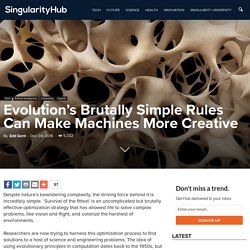
‘Survival of the fittest’ is an uncomplicated but brutally effective optimization strategy that has allowed life to solve complex problems, like vision and flight, and colonize the harshest of environments. Researchers are now trying to harness this optimization process to find solutions to a host of science and engineering problems. The idea of using evolutionary principles in computation dates back to the 1950s, but it wasn’t until the 1960s that the idea really took off. By the 1980s the approach had crossed over from academic curiosities into real-world fields like engineering and economics.
Applying natural selection to computing Evolutionary algorithms are numerous and diverse, but they all seek to replicate key features of biological evolution, such as natural selection, reproduction and mutation. Biological evolution can take millennia to show noticeable results. Image Credit: Shutterstock. What is a 'computer' anymore? What is deepmind. Demis Hassabis, Founder of DeepMind Technologies and Artificial-Intelligence Wunderkind at Google, Wants Machines to Think Like Us. Demis Hassabis started playing chess at age four and soon blossomed into a child prodigy.
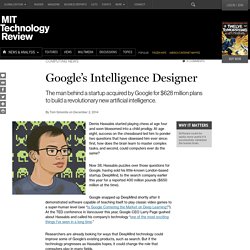
At age eight, success on the chessboard led him to ponder two questions that have obsessed him ever since: first, how does the brain learn to master complex tasks; and second, could computers ever do the same? Now 38, Hassabis puzzles over those questions for Google, having sold his little-known London-based startup, DeepMind, to the search company earlier this year for a reported 400 million pounds ($650 million at the time). Google snapped up DeepMind shortly after it demonstrated software capable of teaching itself to play classic video games to a super-human level (see “Is Google Cornering the Market on Deep Learning?”). Google Search Will Be Your Next Brain — Backchannel. “I need to know a bit about your background,” says Geoffrey Hinton.
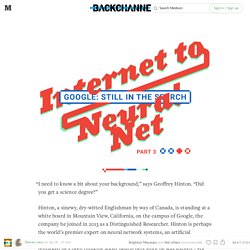
“Did you get a science degree?” How Ada Lovelace and Charles Babbage Invented the World’s First Computer: An Illustrated Adventure in Footnotes and Friendship. By Maria Popova The story of how an improbable pair forever changed our horizons of the possible.
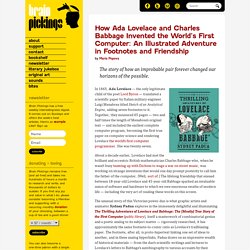
In 1843, Ada Lovelace — the only legitimate child of the poet Lord Byron — translated a scientific paper by Italian military engineer Luigi Menabrea titled Sketch of an Analytical Engine, adding seven footnotes to it. Together, they measured 65 pages — two and half times the length of Menabrea’s original text — and included the earliest complete computer program, becoming the first true paper on computer science and rendering Lovelace the world’s first computer programmer. Hyperconnectivity and the future of internet communication. "Hyperconnectivity and the Future of Internet Communication" (Lambert Academic Publishing, May 2015) is the title of a new book edited by City University London Professor of Pervasive Computing, Professor Adrian Cheok.
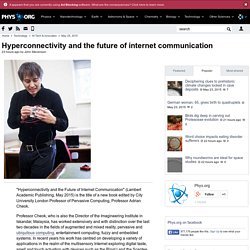
Professor Cheok, who is also the Director of the Imagineering Institute in Iskandar, Malaysia, has worked extensively and with distinction over the last two decades in the fields of augmented and mixed reality, pervasive and ubiquitous computing, entertainment computing, fuzzy and embedded systems. In recent years his work has centred on developing a variety of applications in the realm of the multisensory Internet exploring digital taste, smell and touch actuation with devices such as the RingU and the Scentee. How Quantum Computing Will Change The World! New 'deep learning' technique enables robot mastery of skills via trial and error. UC Berkeley researchers have developed algorithms that enable robots to learn motor tasks through trial and error using a process that more closely approximates the way humans learn, marking a major milestone in the field of artificial intelligence.
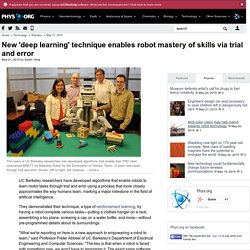
Google a step closer to developing machines with human-like intelligence. Computers will have developed “common sense” within a decade and we could be counting them among our friends not long afterwards, one of the world’s leading AI scientists has predicted.
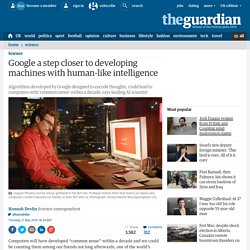
DNA Hard Drive Could Store Data For Millions Of Years. Inspired by fossilized bones, researchers say they’ve found a way to preserve data in the form of DNA encased in silica.
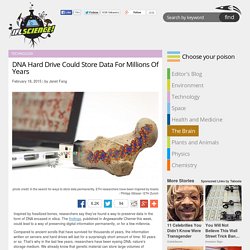
6 cutting-edge programming languages worth learning now. The big languages are popular for a reason: They offer a huge foundation of open source code, libraries, and frameworks that make finishing the job easier.
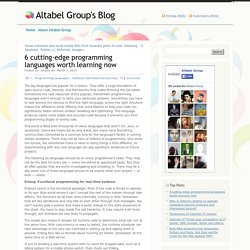
Sometimes the vast resources of the popular, mainstream programming languages aren’t enough to solve your particular problem. Sometimes you have to look beyond the obvious to find the right language, where the right structure makes the difference while offering that extra feature to help your code run significantly faster without endless tweaking and optimizing. Quantum Computing Is About to Overturn Cybersecurity’s Balance of Power. Quantum Computing Is About to Overturn Cybersecurity’s Balance of Power “Spooky action at a distance” is how Albert Einstein described one of the key principles of quantum mechanics: entanglement.
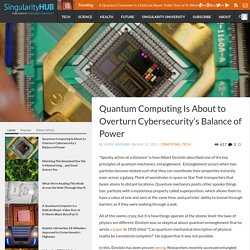
Entanglement occurs when two particles become related such that they can coordinate their properties instantly even across a galaxy. DARPA Aims to Create Software That Can Evolve Over 100 Years. The future of technology will "pale" the previous 20 years. Computers That Know How You Feel Will Soon Be Everywhere. From Mega-Machines to Mega-Algorithms. How do we build resistance to algorithmic systems of domination when their rewards and punishments are both hidden and immaterial? An earlier version of this article was presented at the Digital Labor: Sweatshops, Picket Lines, Barricades conference, which took place in New York City, November 14–16, 2014.In the middle of last century, the historian Lewis Mumford coined the term mega-machine to describe organizations in which humans function like cogs—such as the bureaucracies that rapidly developed and spread during the Industrial Revolution.
Google Unveils New Cross Platform Design Language “Material Design” Google announced a new universal design language, called Material Design, as part of the forthcoming “L” release of Google’s Android mobile operating system. The design is meant to offer a more consistent, universal look-and-feel across mobile, tablets, desktop and “beyond,” the company explains. DARPA taps golden age computers to solve tough simulations. If you thought modern computers were fast enough to solve any problem, nope! DARPA creating software that won't need upgrades for a century. Software upgrades and outdated applications that don't work on new platforms are just a fact of life for people who use computers and other devices. DARPA, however, wants to change that by making software systems that can run for over a century without getting updates from their developers and despite upgrades in hardware. How contextual apps can finally make smart devices smart. Wikipedia And The Death Of The Expert.
Commodore 64. Der Commodore 64 (kurz C64, umgangssprachlich 64er oder „Brotkasten“) ist ein 8-Bit-Heimcomputer mit 64 KB Arbeitsspeicher. Sinclair ZX81. Tandy TRS 80 Model 100.